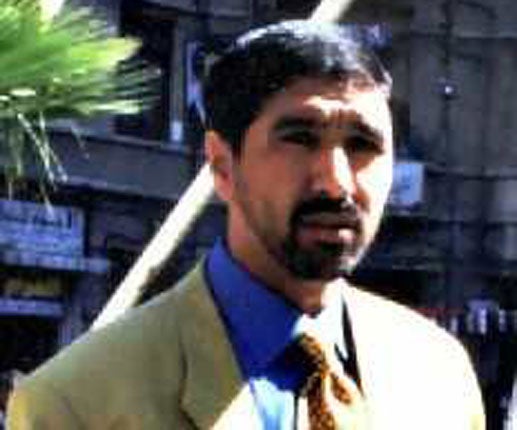Robert Fisk: Scandal of six held in Guantanamo even after Bush plot claim is dropped
No evidence that men living in Bosnia plotted attack on Sarajevo embassy

Your support helps us to tell the story
From reproductive rights to climate change to Big Tech, The Independent is on the ground when the story is developing. Whether it's investigating the financials of Elon Musk's pro-Trump PAC or producing our latest documentary, 'The A Word', which shines a light on the American women fighting for reproductive rights, we know how important it is to parse out the facts from the messaging.
At such a critical moment in US history, we need reporters on the ground. Your donation allows us to keep sending journalists to speak to both sides of the story.
The Independent is trusted by Americans across the entire political spectrum. And unlike many other quality news outlets, we choose not to lock Americans out of our reporting and analysis with paywalls. We believe quality journalism should be available to everyone, paid for by those who can afford it.
Your support makes all the difference.In the dying days of the Bush administration, yet another presidential claim in the "war on terror" has been proved false by the withdrawal of the main charge against six Algerians held without trial for nearly seven years at Guantanamo prison camp.
George Bush's assertion in his 2002 State of the Union address – the same speech in which he wrongly claimed that Saddam Hussein had tried to import aluminium tubes from Niger – was that "our soldiers, working with the Bosnian government, seized terrorists who were plotting to bomb our embassy [in Sarajevo]." Not only has the US government withdrawn that charge against the six Algerians, all of whom had taken citizenship or residence in Bosnia, but lawyers defending the Arabs – who had already been acquitted of such a plot in a Sarajevo court – have found that the US threatened to pull its troops out of the Nato peacekeeping force in Bosnia if the men were not handed over. According to testimony presented by the Bosnian Prime Minister, Alija Behman, the deputy US ambassador to Bosnia in 2001, Christopher Hoh, told him that if he did not hand the men to the Americans, "then let God protect Bosnia and Herzegovina".
That such a threat should be made – and the international High Representative to Bosnia at the time, Wolfgang Petritsch, has also told lawyers it was – shows for the first time just how ruthless and unprincipled US foreign policy had become in Mr Bush's "war on terror". By withdrawing their military and diplomatic support for the Bosnian peace process, the Americans would have backed out of the Dayton accord which they themselves had negotiated. Then the Bosnian government would have lost its legitimacy and the country might have collapsed back into a civil war which claimed the lives of tens of thousands of civilians and involved mass rape as well as massacre. The people of Bosnia might then have endured "terror" on a scale far greater than the attacks of al-Qa'ida against the United States.
When the Bosnian court was preparing to release their six prisoners, Prime Minister Behman was informed that Mr Bush, Vice-President Richard Cheney and the Defence Secretary, Donald Rumsfeld, had been personally briefed and the White House had decided that, if they were freed, US troops in the Nato Stabilisation Force in Bosnia would seize them, using "whatever force is necessary". So, despite a three-month investigation by the Bosnian police, their clearance and a specific demand by the Dayton-established Bosnian Human Rights Chamber that they should not be forced to leave Bosnia, US forces seized all six, shackled and blindfolded them and put them on a plane to Guantanamo.
Mustafa Idir, Mohamed Nechla, Hadj Boudella, Lakhdar Boumedienne, Belkacem Bensayah and Saber Lahmar have remained there since, the only European citizens still in Guanatanamo. Five of their wives are still waiting for them in Bosnia along with 20 of their children, two of whom their fathers have never seen. Their case will be put to a habeas corpus district court hearing in Washington next week – the six will appear in a live transmission from Guantanamo – where their lawyers will point out that another critical charge has also been withdrawn by the US government.
The administration has withdrawn evidence given by a federal prisoner, Enaam Arnaout, against Boudella – that he trained at an al-Qa'ida camp in Afghanistan – when lawyers were about to discover that the US Justice Department had said five years earlier that an FBI interview with the man was "not reliable".
Even stranger is that the six prisoners are claimed by the US to be "enemy combatants" when – with the dropping of the embassy bomb-plot charge – there is no evidence they have ever fought US troops or planned to attack US interests anywhere in the world. Part of the case against Bensayah involved the alleged discovery of a piece of paper at his home, bearing a telephone number for an al-Qa'ida operative, Abu Zubayder. "The Bosnian police couldn't get this number to work in Afghanistan or Pakistan," one of the prisoners' lawyers, Stephen Oleskey, says. "Now we believe an announcement that the paper had been discovered was made before it was 'found'."
Mr Oleskey says Clint Williamson, the US war crimes ambassador, met Bosnia's Prime Minister, Nicola Spiric, this week. "There's only one reason he makes these visits," he said. "To negotiate the return of people in Guantanamo." The White House may intend to save itself further embarrassment by ending the torment of six more apparently innocent young men.
Join our commenting forum
Join thought-provoking conversations, follow other Independent readers and see their replies
Comments